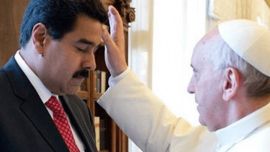San Luis will be voting tomorrow without the surname of Rodríguez Saá on the ballot for the first time in 40 years (except in 2011), a name which takes us down memory lane with the cable television miniseries Diciembre 2001 kicking off last Wednesday since Adolfo Rodríguez Saá was the last president of that fateful month. That famous “Begone with them all” 2001 slogan of anti-system outrage against politicians is now more in the air than at any time since then, while today’s currency seems to be entering irreversibly into a similar terminal phase. Are we also on the road to the wildly atypical 2003 elections which saw no less than five candidates in a 14 to 24 percent range? Back then Argentina was still 16 months away from voting day while there are just 19 weeks to go now but last week’s disarray in the ranks of the Juntos por el Cambio opposition coalition points to a similar fragmentation unfolding at greater speed.
History never repeats itself exactly and there is at least one major difference, the PASO primary filter in force since 2009 (even if much of Kirchnerite Peronism seems bent on ignoring its own creation). The opposition mess also offers the positive aspect of preventing history repeating itself in the form of the equally dysfunctional and weakly led Alliance back in 2001 and the Frente de Todos coalition now – if a political team lacks any common denominator (other than polarisation against the now fading star of Vice-President Cristina Fernández de Kirchner), better to find out now than when in office.
If the 1999 presidential elections with 87 percent voting for the two main presidential candidates were followed by extreme fragmentation in 2003, could there now be a similar contrast underway between the upcoming contest and the 2019 voting when 88.5 percent opted for Frente de Todos or Juntos por el Cambio? This fragmentation is even more extreme with today’s personalised politics – traditional party labels like Peronism or Radicalism are falling increasingly into disuse with political discourse revolving around names like Patricia Bullrich or Javier Milei or even first names (Cristina or the “Gustavo Gobernador” ticket winning the May 14 provincial elections in Salta). Atomised personalities who seem more interested in speaking to the media and the social networks rather than to each other (including and especially political allies) or even the voter.
The alternative to fragmentation decomposing into atomization would be recomposing alliances. As the founding father of Juntos por el Cambio, ex-president Mauricio Macri is making it increasingly clear that he would be far more comfortable with Milei's libertarians than with most Radicals, to give one example, while Milei is in turn reviving the memories of two decades ago by increasingly picking up the pieces from the winner of the 2003 first round, the late Carlos Menem. Should any Macri-Milei alliance prosper, this would mark a veritable revolution in Argentine politics since thus vacating the middle ground has never previously been considered a winning strategy. But then again many things are possible in fragmented voting (thinking back to the 2003 election eventually won by its runner-up). Yet if these possibilities extend to a deeply unpopular ruling coalition winning after all, could this turn the wheel full circle and revive the previous polarisation? But the processes of political evolution do not necessarily fall in line with the electoral calendar – the above speculation collides with the fact that campaign alliances must be defined by next Wednesday and thus might well be idle. We shall know far more by next weekend.
Also making such speculation idle is the fact that the vast majority of people have much greater urgencies than the vanity fair of political egos, especially runaway inflation. The campaign’s real need is for platforms, not personalities, even if the definition of constructive alternatives faces the extremely uphill task of not only building consensus in a fragmented political universe but also finding an echo amid a generally negative public mood more attracted by anti-system rage. Yet a crisis always offers several exit doors and we can learn from history by choosing them better – if that last month of 2001 now being commemorated by a cable TV miniseries ended in the default shortcut of Rodríguez Saá with the more permanent solutions coming from Kirchnerism, we should be looking much harder at the various options on offer in order to prevent history from repeating itself.


















Comments